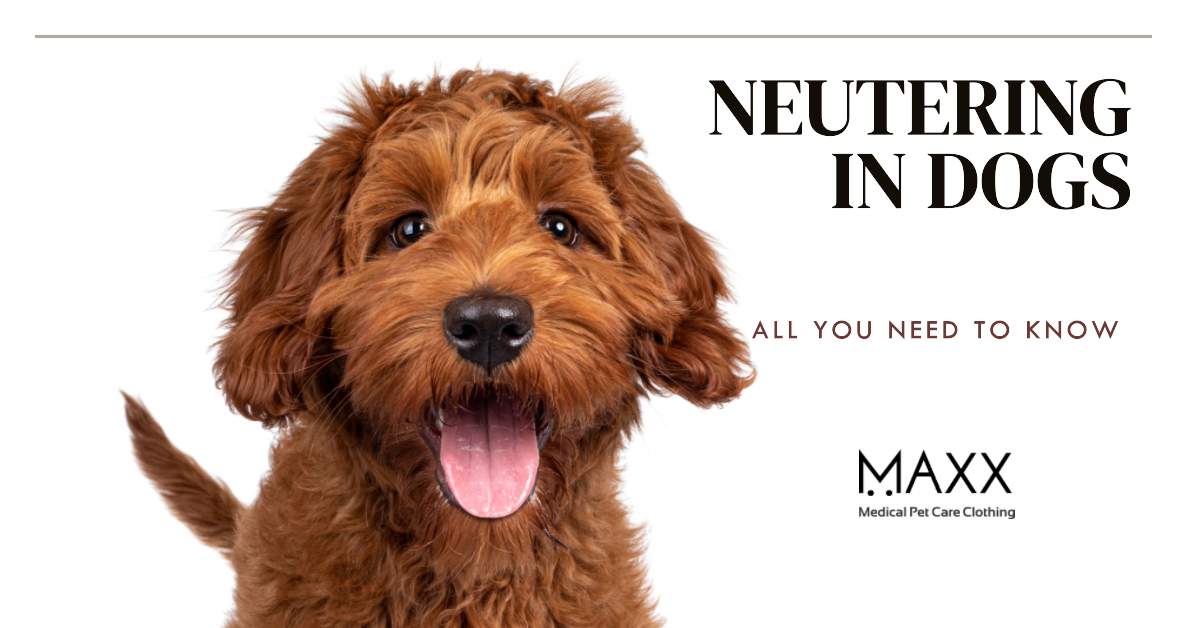MAXX Pet Blogs
Neutering in Dogs: Everything You Need to Know
Neutering in Dogs: Everything You Need to Know
At our company, we understand the importance of providing pet owners with valuable information about their furry friends.
One topic that often comes up is neutering in dogs.
Neutering, also known as castration, is a surgical procedure that removes a male dog’s testicles.
It is a common procedure that has many benefits for both the dog and the owner.
In this article, we will cover everything you need to know about neutering in dogs, including the benefits, risks, and what to expect before, during, and after the procedure.
Benefits of Neutering in Dogs
One of the biggest benefits of neutering in dogs is reducing the risk of certain diseases, including
testicular cancer, prostate cancer, and other health issues related to the reproductive system.
Neutering can also help reduce unwanted behaviors, such as aggression and marking territory.
Neutering also has several benefits for the owner.
It can help reduce the number of unwanted litters and prevent the need for costly medical treatment for diseases related to the reproductive system.
Additionally, neutered dogs may be less likely to roam and get into fights with other dogs, which can be dangerous for both the dog and the owner.
Risks of Neutering in Dogs
As with any surgical procedure, there are risks associated with neutering in dogs.
The most common risks include bleeding, infection, and reactions to anesthesia.
However, these risks are relatively low and can be minimized with proper pre-operative care and post-operative care.
kindly read the : General Pre-Op Instructions for Dogs and Cats
It is important to note that neutering can also have some potential side effects.
For example, some dogs may experience weight gain or changes in behavior after the procedure.
However, these side effects can typically be managed with proper diet and exercise, and are generally outweighed by the benefits of the procedure.
What to Expect Before Neutering
Before the procedure, your veterinarian will conduct a thorough physical exam to ensure that your dog is healthy enough to undergo surgery.
Your dog may also need to have blood work done to check for any underlying health issues that could affect the surgery.
Your veterinarian will also give you specific instructions on how to prepare your dog for the procedure.
This may include fasting for a certain period of time before the surgery, as well as other pre-operative care instructions.
What to Expect During Neutering
During the procedure, your dog will be placed under general anesthesia to ensure that he is comfortable and pain-free throughout the surgery.
Your veterinarian will then make a small incision in your dog’s scrotum and remove the testicles.
The incision will be closed with stitches or surgical glue.
What to Expect After Neutering
After the procedure, your dog will need time to recover.
Your veterinarian will give you specific instructions on how to care for your dog after the surgery, including instructions on feeding, exercise, and wound care.
It is important to monitor your dog for any signs of complications, such as excessive bleeding or signs of infection.
If you notice any unusual symptoms, contact your veterinarian immediately.
Maxx Medical Pet Care Clothing offers high-quality pet clothing options that provide both comfort and protection for your furry friends.
If your pet has undergone surgery, it is important to give them the best possible care to aid their recovery.
One way to do this is by using surgical pet shirts, which can help to protect the incision site, reduce the risk of infection and keep your pet comfortable.
These shirts are designed to fit snugly, but not too tightly, to prevent your pet from scratching or biting the affected area.
Maxx Medical Pet Care Clothing offers a range of surgical pet shirts in different sizes and designs, so you can choose the best one for your pet’s needs.
Conclusion
Neutering in dogs is a common and beneficial procedure that can improve the health and wellbeing of both the dog and the owner.
While there are some risks and potential side effects associated with the procedure, these can be minimized with proper pre-operative care and post-operative care.
If you are considering neutering your dog, we recommend speaking with your veterinarian to discuss the benefits and risks of the procedure, as well as any specific considerations based on your dog’s individual health and circumstances.

